How Responsible is Corporate Social Responsibility in the Real World?
VerifiedAdded on 2022/11/17
|11
|3389
|462
Essay
AI Summary
This essay delves into the significance of Corporate Social Responsibility (CSR) in the contemporary business landscape. It examines how companies are integrating CSR into their operations to enhance brand reputation, customer trust, and financial performance. The essay explores various dimensions of CSR, including legal, ethical, social, and environmental aspects, and highlights real-world examples from companies such as Google, Adidas, Amazon, and others. These examples illustrate how businesses are implementing CSR policies to reduce environmental impact, improve employee conditions, and contribute to social welfare. The essay also discusses the challenges and criticisms associated with CSR, including the lack of international guidelines and the potential for greenwashing. Ultimately, the essay seeks to answer the question of how responsible CSR practices are in the real world, considering both the benefits and limitations of corporate social responsibility initiatives and the need for better enforcement to make CSR more effective.
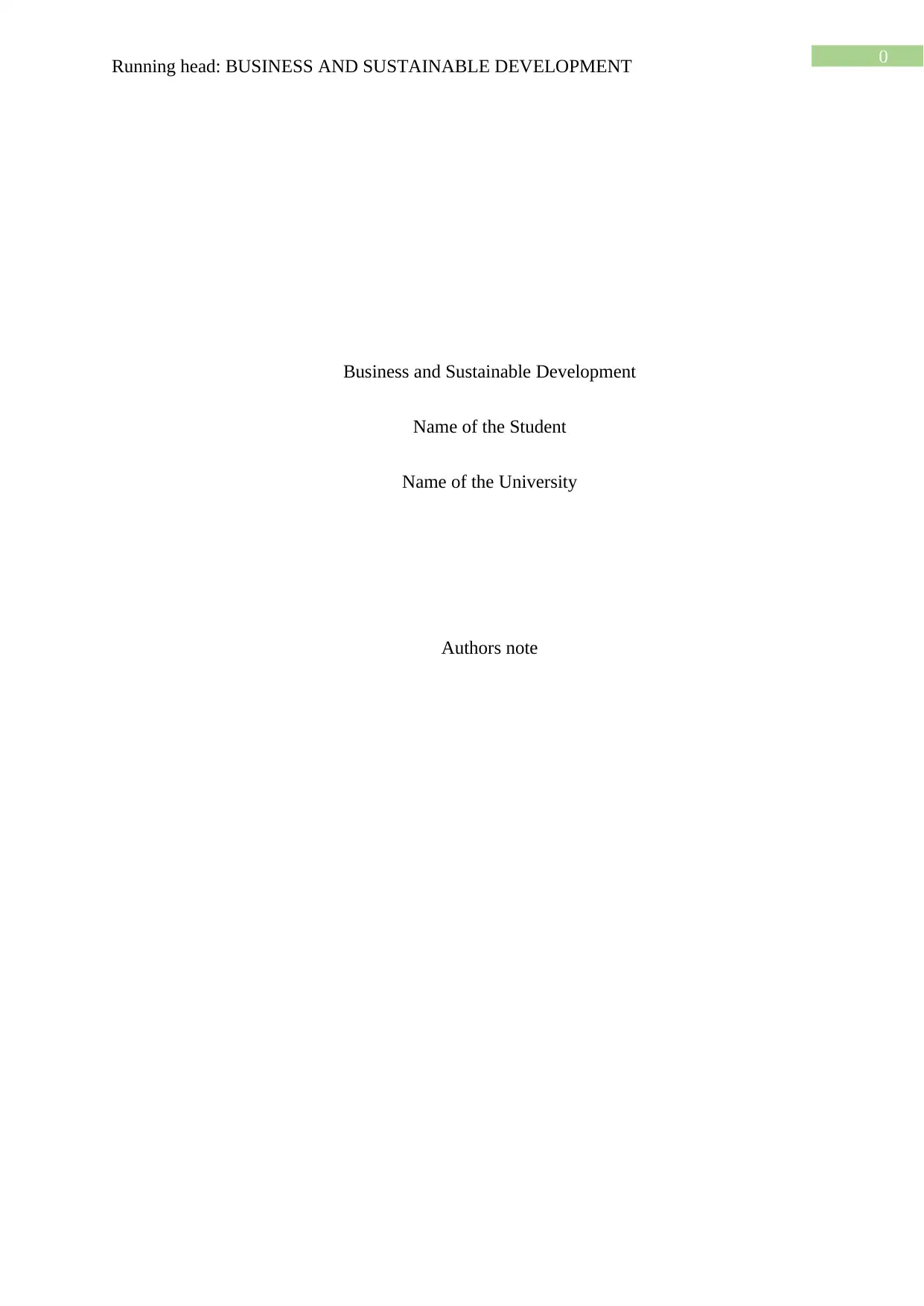
0
Running head: BUSINESS AND SUSTAINABLE DEVELOPMENT
Business and Sustainable Development
Name of the Student
Name of the University
Authors note
Running head: BUSINESS AND SUSTAINABLE DEVELOPMENT
Business and Sustainable Development
Name of the Student
Name of the University
Authors note
Paraphrase This Document
Need a fresh take? Get an instant paraphrase of this document with our AI Paraphraser
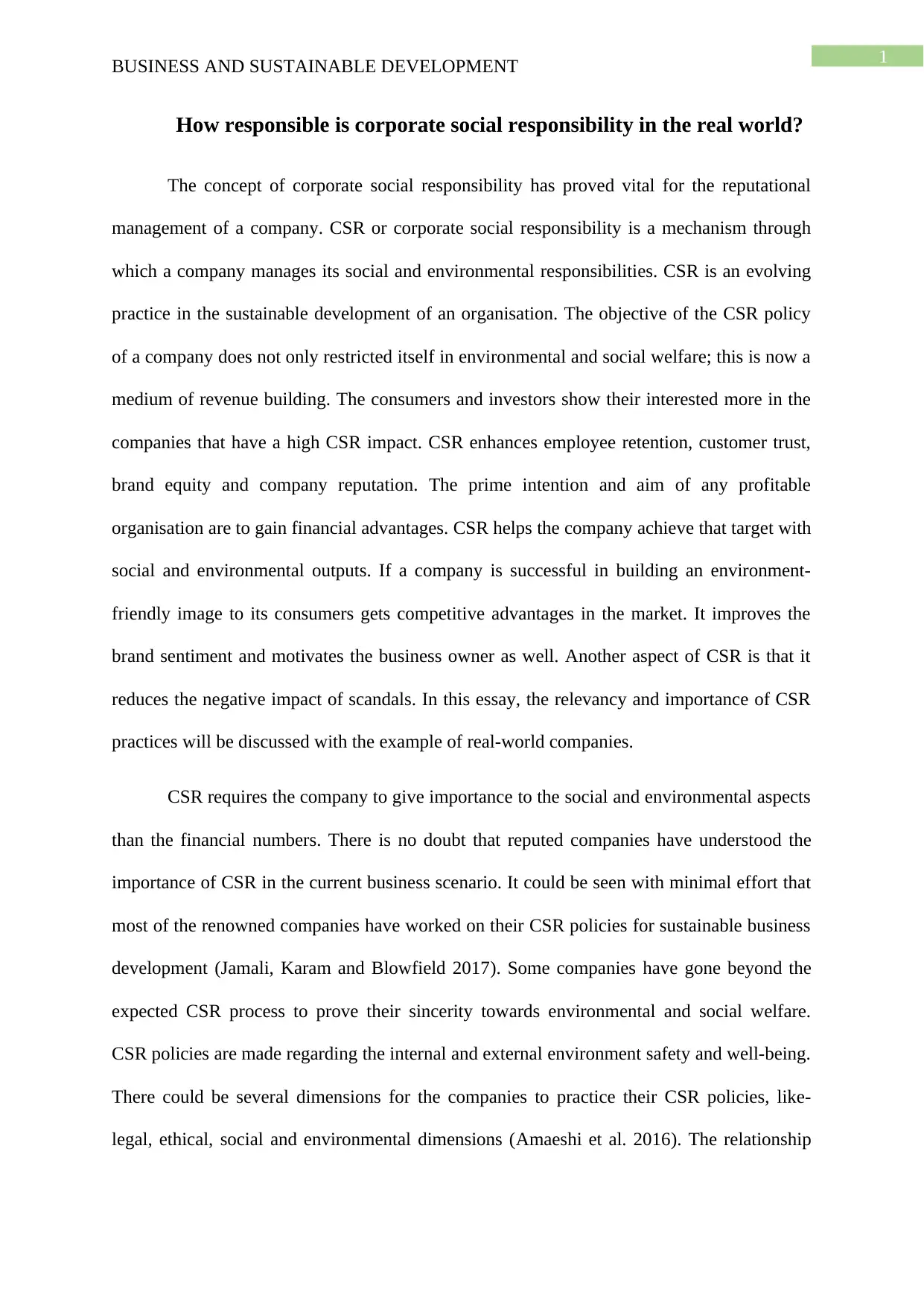
1
BUSINESS AND SUSTAINABLE DEVELOPMENT
How responsible is corporate social responsibility in the real world?
The concept of corporate social responsibility has proved vital for the reputational
management of a company. CSR or corporate social responsibility is a mechanism through
which a company manages its social and environmental responsibilities. CSR is an evolving
practice in the sustainable development of an organisation. The objective of the CSR policy
of a company does not only restricted itself in environmental and social welfare; this is now a
medium of revenue building. The consumers and investors show their interested more in the
companies that have a high CSR impact. CSR enhances employee retention, customer trust,
brand equity and company reputation. The prime intention and aim of any profitable
organisation are to gain financial advantages. CSR helps the company achieve that target with
social and environmental outputs. If a company is successful in building an environment-
friendly image to its consumers gets competitive advantages in the market. It improves the
brand sentiment and motivates the business owner as well. Another aspect of CSR is that it
reduces the negative impact of scandals. In this essay, the relevancy and importance of CSR
practices will be discussed with the example of real-world companies.
CSR requires the company to give importance to the social and environmental aspects
than the financial numbers. There is no doubt that reputed companies have understood the
importance of CSR in the current business scenario. It could be seen with minimal effort that
most of the renowned companies have worked on their CSR policies for sustainable business
development (Jamali, Karam and Blowfield 2017). Some companies have gone beyond the
expected CSR process to prove their sincerity towards environmental and social welfare.
CSR policies are made regarding the internal and external environment safety and well-being.
There could be several dimensions for the companies to practice their CSR policies, like-
legal, ethical, social and environmental dimensions (Amaeshi et al. 2016). The relationship
BUSINESS AND SUSTAINABLE DEVELOPMENT
How responsible is corporate social responsibility in the real world?
The concept of corporate social responsibility has proved vital for the reputational
management of a company. CSR or corporate social responsibility is a mechanism through
which a company manages its social and environmental responsibilities. CSR is an evolving
practice in the sustainable development of an organisation. The objective of the CSR policy
of a company does not only restricted itself in environmental and social welfare; this is now a
medium of revenue building. The consumers and investors show their interested more in the
companies that have a high CSR impact. CSR enhances employee retention, customer trust,
brand equity and company reputation. The prime intention and aim of any profitable
organisation are to gain financial advantages. CSR helps the company achieve that target with
social and environmental outputs. If a company is successful in building an environment-
friendly image to its consumers gets competitive advantages in the market. It improves the
brand sentiment and motivates the business owner as well. Another aspect of CSR is that it
reduces the negative impact of scandals. In this essay, the relevancy and importance of CSR
practices will be discussed with the example of real-world companies.
CSR requires the company to give importance to the social and environmental aspects
than the financial numbers. There is no doubt that reputed companies have understood the
importance of CSR in the current business scenario. It could be seen with minimal effort that
most of the renowned companies have worked on their CSR policies for sustainable business
development (Jamali, Karam and Blowfield 2017). Some companies have gone beyond the
expected CSR process to prove their sincerity towards environmental and social welfare.
CSR policies are made regarding the internal and external environment safety and well-being.
There could be several dimensions for the companies to practice their CSR policies, like-
legal, ethical, social and environmental dimensions (Amaeshi et al. 2016). The relationship
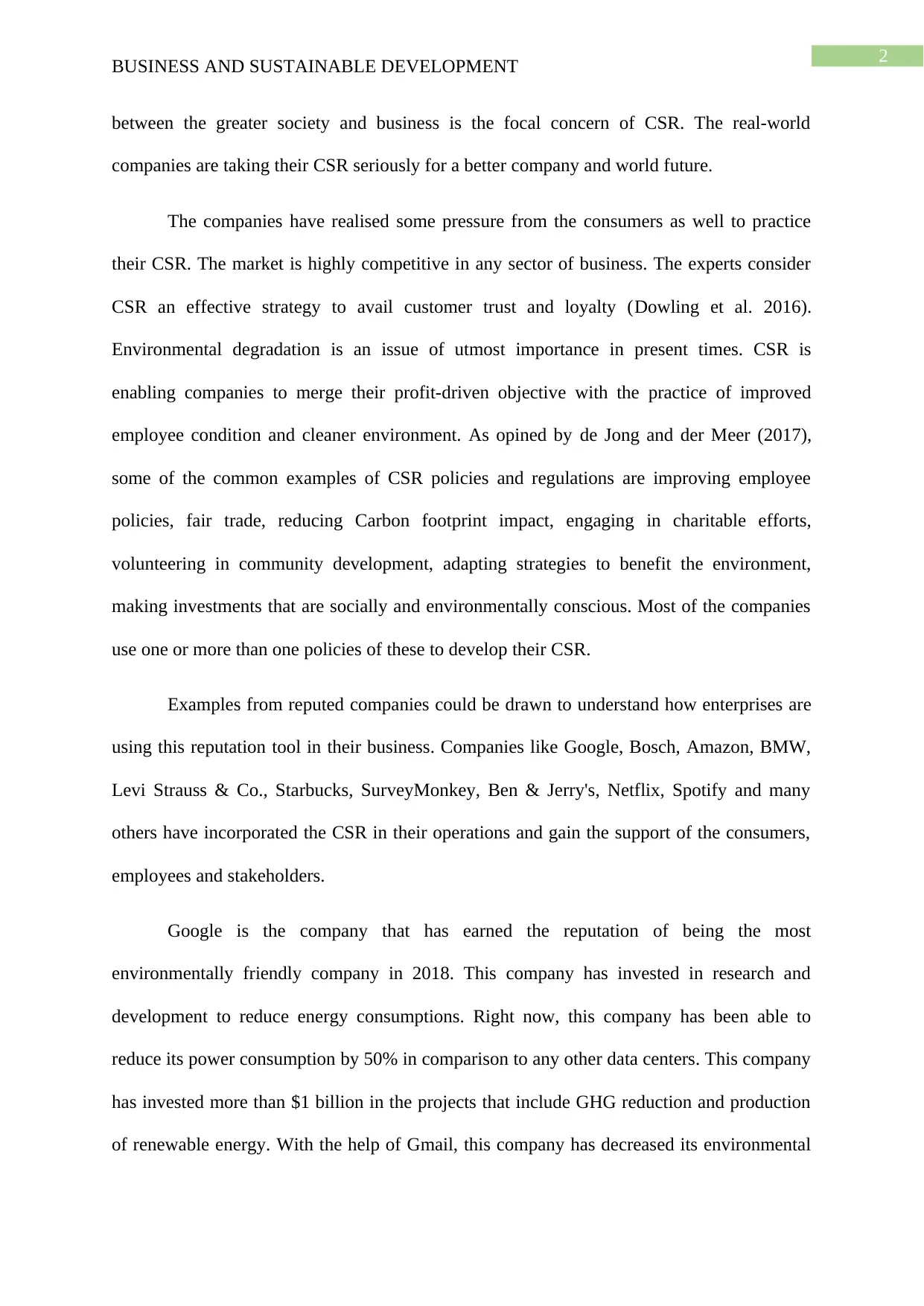
2
BUSINESS AND SUSTAINABLE DEVELOPMENT
between the greater society and business is the focal concern of CSR. The real-world
companies are taking their CSR seriously for a better company and world future.
The companies have realised some pressure from the consumers as well to practice
their CSR. The market is highly competitive in any sector of business. The experts consider
CSR an effective strategy to avail customer trust and loyalty (Dowling et al. 2016).
Environmental degradation is an issue of utmost importance in present times. CSR is
enabling companies to merge their profit-driven objective with the practice of improved
employee condition and cleaner environment. As opined by de Jong and der Meer (2017),
some of the common examples of CSR policies and regulations are improving employee
policies, fair trade, reducing Carbon footprint impact, engaging in charitable efforts,
volunteering in community development, adapting strategies to benefit the environment,
making investments that are socially and environmentally conscious. Most of the companies
use one or more than one policies of these to develop their CSR.
Examples from reputed companies could be drawn to understand how enterprises are
using this reputation tool in their business. Companies like Google, Bosch, Amazon, BMW,
Levi Strauss & Co., Starbucks, SurveyMonkey, Ben & Jerry's, Netflix, Spotify and many
others have incorporated the CSR in their operations and gain the support of the consumers,
employees and stakeholders.
Google is the company that has earned the reputation of being the most
environmentally friendly company in 2018. This company has invested in research and
development to reduce energy consumptions. Right now, this company has been able to
reduce its power consumption by 50% in comparison to any other data centers. This company
has invested more than $1 billion in the projects that include GHG reduction and production
of renewable energy. With the help of Gmail, this company has decreased its environmental
BUSINESS AND SUSTAINABLE DEVELOPMENT
between the greater society and business is the focal concern of CSR. The real-world
companies are taking their CSR seriously for a better company and world future.
The companies have realised some pressure from the consumers as well to practice
their CSR. The market is highly competitive in any sector of business. The experts consider
CSR an effective strategy to avail customer trust and loyalty (Dowling et al. 2016).
Environmental degradation is an issue of utmost importance in present times. CSR is
enabling companies to merge their profit-driven objective with the practice of improved
employee condition and cleaner environment. As opined by de Jong and der Meer (2017),
some of the common examples of CSR policies and regulations are improving employee
policies, fair trade, reducing Carbon footprint impact, engaging in charitable efforts,
volunteering in community development, adapting strategies to benefit the environment,
making investments that are socially and environmentally conscious. Most of the companies
use one or more than one policies of these to develop their CSR.
Examples from reputed companies could be drawn to understand how enterprises are
using this reputation tool in their business. Companies like Google, Bosch, Amazon, BMW,
Levi Strauss & Co., Starbucks, SurveyMonkey, Ben & Jerry's, Netflix, Spotify and many
others have incorporated the CSR in their operations and gain the support of the consumers,
employees and stakeholders.
Google is the company that has earned the reputation of being the most
environmentally friendly company in 2018. This company has invested in research and
development to reduce energy consumptions. Right now, this company has been able to
reduce its power consumption by 50% in comparison to any other data centers. This company
has invested more than $1 billion in the projects that include GHG reduction and production
of renewable energy. With the help of Gmail, this company has decreased its environmental
⊘ This is a preview!⊘
Do you want full access?
Subscribe today to unlock all pages.

Trusted by 1+ million students worldwide
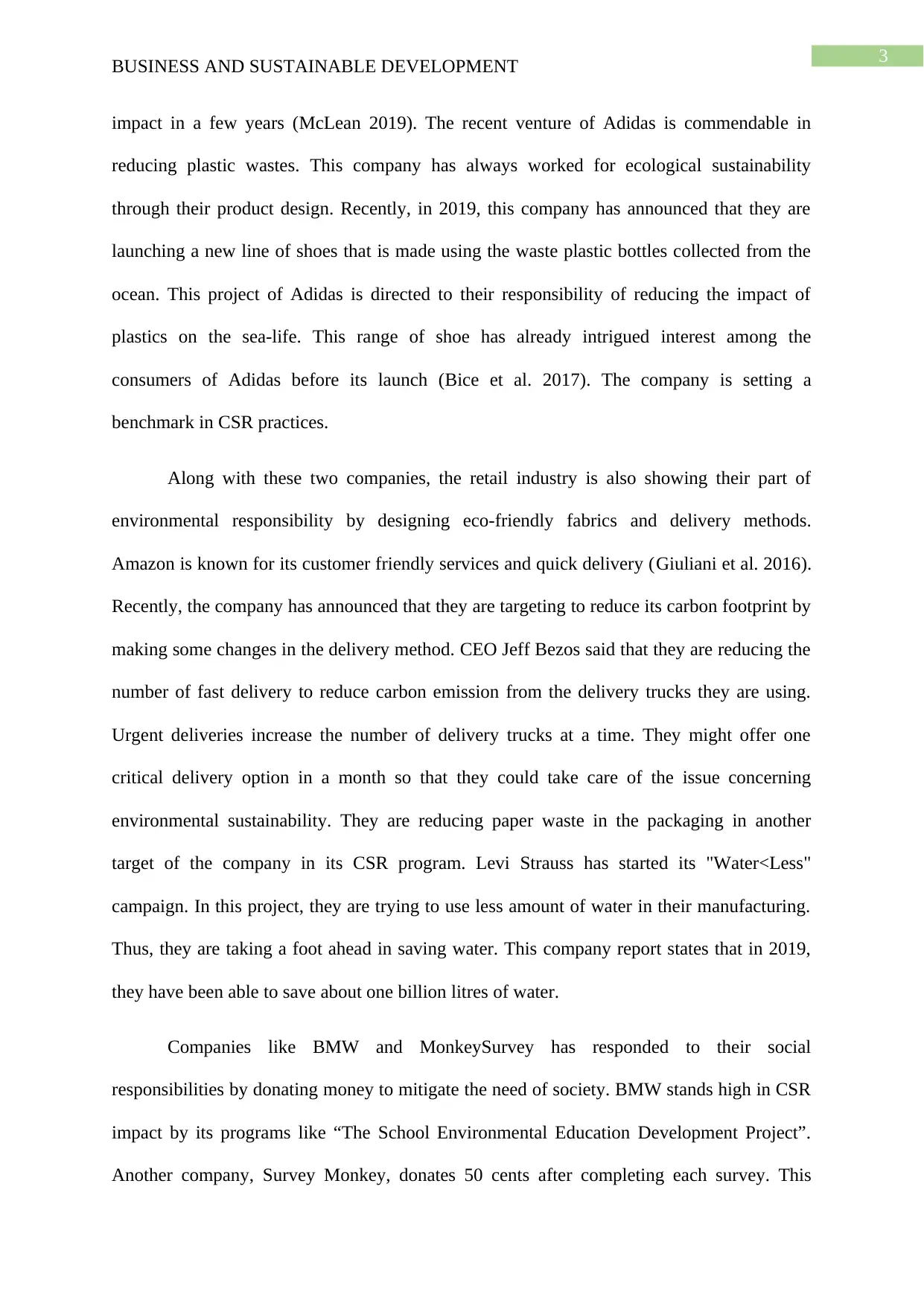
3
BUSINESS AND SUSTAINABLE DEVELOPMENT
impact in a few years (McLean 2019). The recent venture of Adidas is commendable in
reducing plastic wastes. This company has always worked for ecological sustainability
through their product design. Recently, in 2019, this company has announced that they are
launching a new line of shoes that is made using the waste plastic bottles collected from the
ocean. This project of Adidas is directed to their responsibility of reducing the impact of
plastics on the sea-life. This range of shoe has already intrigued interest among the
consumers of Adidas before its launch (Bice et al. 2017). The company is setting a
benchmark in CSR practices.
Along with these two companies, the retail industry is also showing their part of
environmental responsibility by designing eco-friendly fabrics and delivery methods.
Amazon is known for its customer friendly services and quick delivery (Giuliani et al. 2016).
Recently, the company has announced that they are targeting to reduce its carbon footprint by
making some changes in the delivery method. CEO Jeff Bezos said that they are reducing the
number of fast delivery to reduce carbon emission from the delivery trucks they are using.
Urgent deliveries increase the number of delivery trucks at a time. They might offer one
critical delivery option in a month so that they could take care of the issue concerning
environmental sustainability. They are reducing paper waste in the packaging in another
target of the company in its CSR program. Levi Strauss has started its "Water<Less"
campaign. In this project, they are trying to use less amount of water in their manufacturing.
Thus, they are taking a foot ahead in saving water. This company report states that in 2019,
they have been able to save about one billion litres of water.
Companies like BMW and MonkeySurvey has responded to their social
responsibilities by donating money to mitigate the need of society. BMW stands high in CSR
impact by its programs like “The School Environmental Education Development Project”.
Another company, Survey Monkey, donates 50 cents after completing each survey. This
BUSINESS AND SUSTAINABLE DEVELOPMENT
impact in a few years (McLean 2019). The recent venture of Adidas is commendable in
reducing plastic wastes. This company has always worked for ecological sustainability
through their product design. Recently, in 2019, this company has announced that they are
launching a new line of shoes that is made using the waste plastic bottles collected from the
ocean. This project of Adidas is directed to their responsibility of reducing the impact of
plastics on the sea-life. This range of shoe has already intrigued interest among the
consumers of Adidas before its launch (Bice et al. 2017). The company is setting a
benchmark in CSR practices.
Along with these two companies, the retail industry is also showing their part of
environmental responsibility by designing eco-friendly fabrics and delivery methods.
Amazon is known for its customer friendly services and quick delivery (Giuliani et al. 2016).
Recently, the company has announced that they are targeting to reduce its carbon footprint by
making some changes in the delivery method. CEO Jeff Bezos said that they are reducing the
number of fast delivery to reduce carbon emission from the delivery trucks they are using.
Urgent deliveries increase the number of delivery trucks at a time. They might offer one
critical delivery option in a month so that they could take care of the issue concerning
environmental sustainability. They are reducing paper waste in the packaging in another
target of the company in its CSR program. Levi Strauss has started its "Water<Less"
campaign. In this project, they are trying to use less amount of water in their manufacturing.
Thus, they are taking a foot ahead in saving water. This company report states that in 2019,
they have been able to save about one billion litres of water.
Companies like BMW and MonkeySurvey has responded to their social
responsibilities by donating money to mitigate the need of society. BMW stands high in CSR
impact by its programs like “The School Environmental Education Development Project”.
Another company, Survey Monkey, donates 50 cents after completing each survey. This
Paraphrase This Document
Need a fresh take? Get an instant paraphrase of this document with our AI Paraphraser
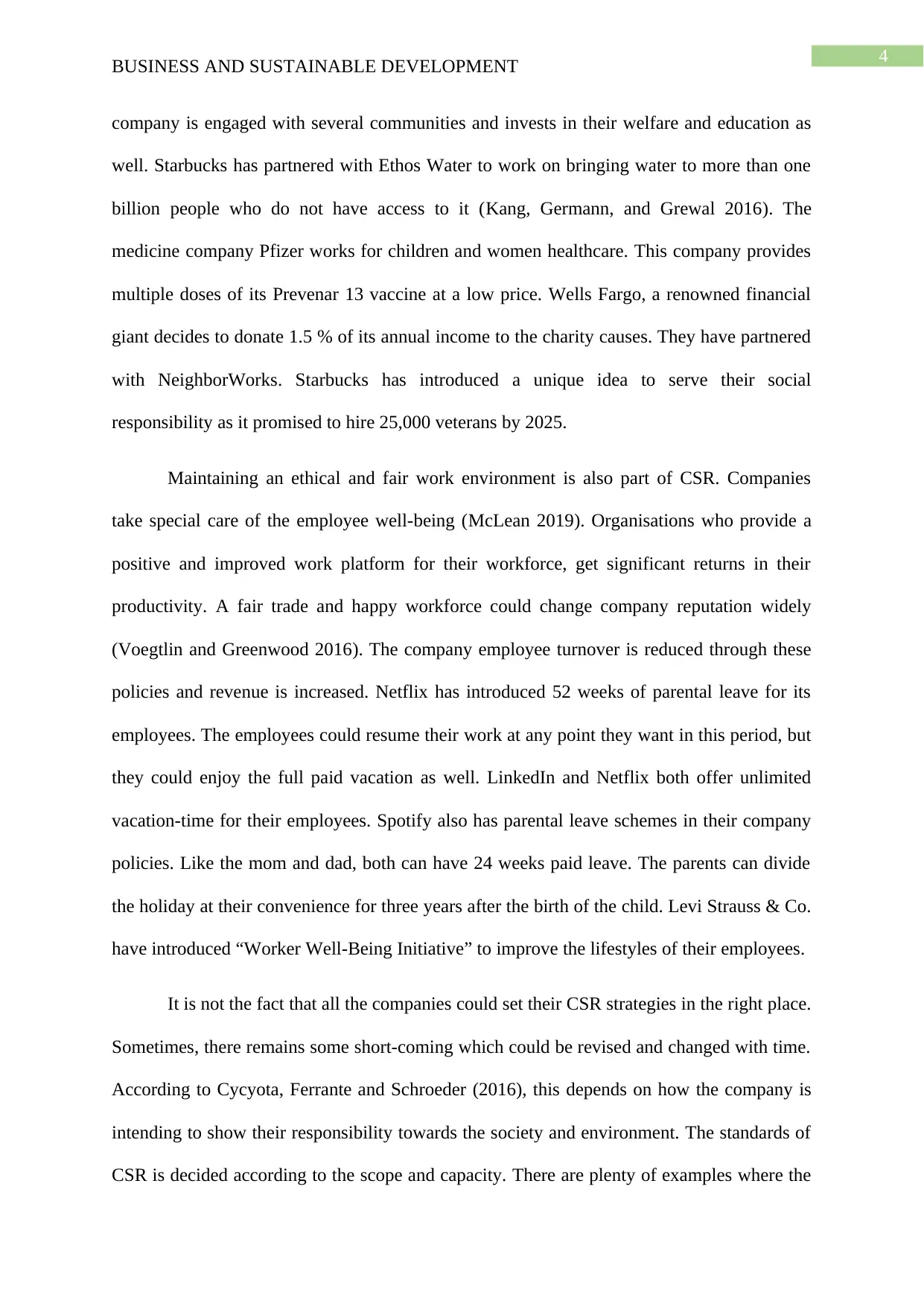
4
BUSINESS AND SUSTAINABLE DEVELOPMENT
company is engaged with several communities and invests in their welfare and education as
well. Starbucks has partnered with Ethos Water to work on bringing water to more than one
billion people who do not have access to it (Kang, Germann, and Grewal 2016). The
medicine company Pfizer works for children and women healthcare. This company provides
multiple doses of its Prevenar 13 vaccine at a low price. Wells Fargo, a renowned financial
giant decides to donate 1.5 % of its annual income to the charity causes. They have partnered
with NeighborWorks. Starbucks has introduced a unique idea to serve their social
responsibility as it promised to hire 25,000 veterans by 2025.
Maintaining an ethical and fair work environment is also part of CSR. Companies
take special care of the employee well-being (McLean 2019). Organisations who provide a
positive and improved work platform for their workforce, get significant returns in their
productivity. A fair trade and happy workforce could change company reputation widely
(Voegtlin and Greenwood 2016). The company employee turnover is reduced through these
policies and revenue is increased. Netflix has introduced 52 weeks of parental leave for its
employees. The employees could resume their work at any point they want in this period, but
they could enjoy the full paid vacation as well. LinkedIn and Netflix both offer unlimited
vacation-time for their employees. Spotify also has parental leave schemes in their company
policies. Like the mom and dad, both can have 24 weeks paid leave. The parents can divide
the holiday at their convenience for three years after the birth of the child. Levi Strauss & Co.
have introduced “Worker Well-Being Initiative” to improve the lifestyles of their employees.
It is not the fact that all the companies could set their CSR strategies in the right place.
Sometimes, there remains some short-coming which could be revised and changed with time.
According to Cycyota, Ferrante and Schroeder (2016), this depends on how the company is
intending to show their responsibility towards the society and environment. The standards of
CSR is decided according to the scope and capacity. There are plenty of examples where the
BUSINESS AND SUSTAINABLE DEVELOPMENT
company is engaged with several communities and invests in their welfare and education as
well. Starbucks has partnered with Ethos Water to work on bringing water to more than one
billion people who do not have access to it (Kang, Germann, and Grewal 2016). The
medicine company Pfizer works for children and women healthcare. This company provides
multiple doses of its Prevenar 13 vaccine at a low price. Wells Fargo, a renowned financial
giant decides to donate 1.5 % of its annual income to the charity causes. They have partnered
with NeighborWorks. Starbucks has introduced a unique idea to serve their social
responsibility as it promised to hire 25,000 veterans by 2025.
Maintaining an ethical and fair work environment is also part of CSR. Companies
take special care of the employee well-being (McLean 2019). Organisations who provide a
positive and improved work platform for their workforce, get significant returns in their
productivity. A fair trade and happy workforce could change company reputation widely
(Voegtlin and Greenwood 2016). The company employee turnover is reduced through these
policies and revenue is increased. Netflix has introduced 52 weeks of parental leave for its
employees. The employees could resume their work at any point they want in this period, but
they could enjoy the full paid vacation as well. LinkedIn and Netflix both offer unlimited
vacation-time for their employees. Spotify also has parental leave schemes in their company
policies. Like the mom and dad, both can have 24 weeks paid leave. The parents can divide
the holiday at their convenience for three years after the birth of the child. Levi Strauss & Co.
have introduced “Worker Well-Being Initiative” to improve the lifestyles of their employees.
It is not the fact that all the companies could set their CSR strategies in the right place.
Sometimes, there remains some short-coming which could be revised and changed with time.
According to Cycyota, Ferrante and Schroeder (2016), this depends on how the company is
intending to show their responsibility towards the society and environment. The standards of
CSR is decided according to the scope and capacity. There are plenty of examples where the
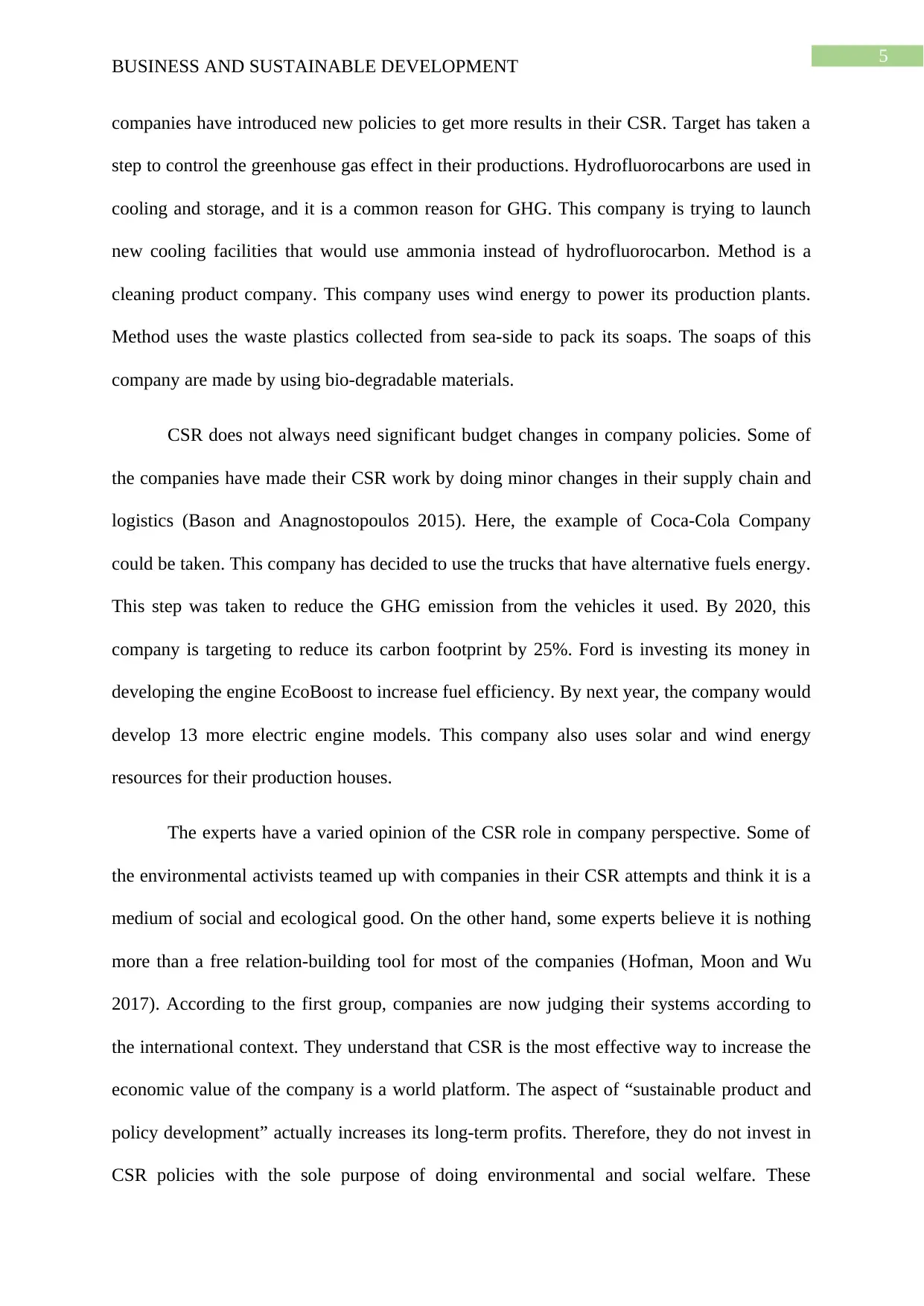
5
BUSINESS AND SUSTAINABLE DEVELOPMENT
companies have introduced new policies to get more results in their CSR. Target has taken a
step to control the greenhouse gas effect in their productions. Hydrofluorocarbons are used in
cooling and storage, and it is a common reason for GHG. This company is trying to launch
new cooling facilities that would use ammonia instead of hydrofluorocarbon. Method is a
cleaning product company. This company uses wind energy to power its production plants.
Method uses the waste plastics collected from sea-side to pack its soaps. The soaps of this
company are made by using bio-degradable materials.
CSR does not always need significant budget changes in company policies. Some of
the companies have made their CSR work by doing minor changes in their supply chain and
logistics (Bason and Anagnostopoulos 2015). Here, the example of Coca-Cola Company
could be taken. This company has decided to use the trucks that have alternative fuels energy.
This step was taken to reduce the GHG emission from the vehicles it used. By 2020, this
company is targeting to reduce its carbon footprint by 25%. Ford is investing its money in
developing the engine EcoBoost to increase fuel efficiency. By next year, the company would
develop 13 more electric engine models. This company also uses solar and wind energy
resources for their production houses.
The experts have a varied opinion of the CSR role in company perspective. Some of
the environmental activists teamed up with companies in their CSR attempts and think it is a
medium of social and ecological good. On the other hand, some experts believe it is nothing
more than a free relation-building tool for most of the companies (Hofman, Moon and Wu
2017). According to the first group, companies are now judging their systems according to
the international context. They understand that CSR is the most effective way to increase the
economic value of the company is a world platform. The aspect of “sustainable product and
policy development” actually increases its long-term profits. Therefore, they do not invest in
CSR policies with the sole purpose of doing environmental and social welfare. These
BUSINESS AND SUSTAINABLE DEVELOPMENT
companies have introduced new policies to get more results in their CSR. Target has taken a
step to control the greenhouse gas effect in their productions. Hydrofluorocarbons are used in
cooling and storage, and it is a common reason for GHG. This company is trying to launch
new cooling facilities that would use ammonia instead of hydrofluorocarbon. Method is a
cleaning product company. This company uses wind energy to power its production plants.
Method uses the waste plastics collected from sea-side to pack its soaps. The soaps of this
company are made by using bio-degradable materials.
CSR does not always need significant budget changes in company policies. Some of
the companies have made their CSR work by doing minor changes in their supply chain and
logistics (Bason and Anagnostopoulos 2015). Here, the example of Coca-Cola Company
could be taken. This company has decided to use the trucks that have alternative fuels energy.
This step was taken to reduce the GHG emission from the vehicles it used. By 2020, this
company is targeting to reduce its carbon footprint by 25%. Ford is investing its money in
developing the engine EcoBoost to increase fuel efficiency. By next year, the company would
develop 13 more electric engine models. This company also uses solar and wind energy
resources for their production houses.
The experts have a varied opinion of the CSR role in company perspective. Some of
the environmental activists teamed up with companies in their CSR attempts and think it is a
medium of social and ecological good. On the other hand, some experts believe it is nothing
more than a free relation-building tool for most of the companies (Hofman, Moon and Wu
2017). According to the first group, companies are now judging their systems according to
the international context. They understand that CSR is the most effective way to increase the
economic value of the company is a world platform. The aspect of “sustainable product and
policy development” actually increases its long-term profits. Therefore, they do not invest in
CSR policies with the sole purpose of doing environmental and social welfare. These
⊘ This is a preview!⊘
Do you want full access?
Subscribe today to unlock all pages.

Trusted by 1+ million students worldwide
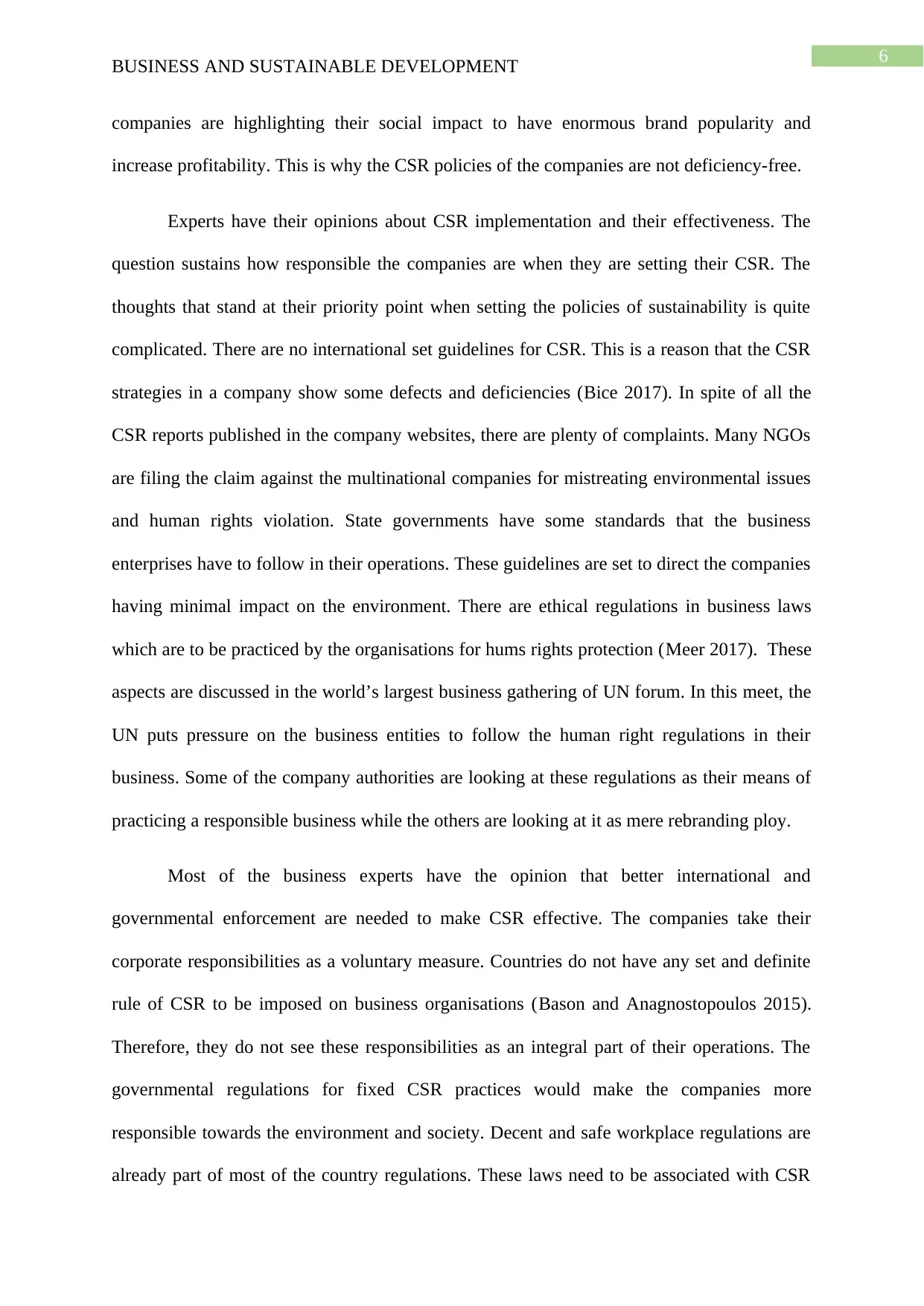
6
BUSINESS AND SUSTAINABLE DEVELOPMENT
companies are highlighting their social impact to have enormous brand popularity and
increase profitability. This is why the CSR policies of the companies are not deficiency-free.
Experts have their opinions about CSR implementation and their effectiveness. The
question sustains how responsible the companies are when they are setting their CSR. The
thoughts that stand at their priority point when setting the policies of sustainability is quite
complicated. There are no international set guidelines for CSR. This is a reason that the CSR
strategies in a company show some defects and deficiencies (Bice 2017). In spite of all the
CSR reports published in the company websites, there are plenty of complaints. Many NGOs
are filing the claim against the multinational companies for mistreating environmental issues
and human rights violation. State governments have some standards that the business
enterprises have to follow in their operations. These guidelines are set to direct the companies
having minimal impact on the environment. There are ethical regulations in business laws
which are to be practiced by the organisations for hums rights protection (Meer 2017). These
aspects are discussed in the world’s largest business gathering of UN forum. In this meet, the
UN puts pressure on the business entities to follow the human right regulations in their
business. Some of the company authorities are looking at these regulations as their means of
practicing a responsible business while the others are looking at it as mere rebranding ploy.
Most of the business experts have the opinion that better international and
governmental enforcement are needed to make CSR effective. The companies take their
corporate responsibilities as a voluntary measure. Countries do not have any set and definite
rule of CSR to be imposed on business organisations (Bason and Anagnostopoulos 2015).
Therefore, they do not see these responsibilities as an integral part of their operations. The
governmental regulations for fixed CSR practices would make the companies more
responsible towards the environment and society. Decent and safe workplace regulations are
already part of most of the country regulations. These laws need to be associated with CSR
BUSINESS AND SUSTAINABLE DEVELOPMENT
companies are highlighting their social impact to have enormous brand popularity and
increase profitability. This is why the CSR policies of the companies are not deficiency-free.
Experts have their opinions about CSR implementation and their effectiveness. The
question sustains how responsible the companies are when they are setting their CSR. The
thoughts that stand at their priority point when setting the policies of sustainability is quite
complicated. There are no international set guidelines for CSR. This is a reason that the CSR
strategies in a company show some defects and deficiencies (Bice 2017). In spite of all the
CSR reports published in the company websites, there are plenty of complaints. Many NGOs
are filing the claim against the multinational companies for mistreating environmental issues
and human rights violation. State governments have some standards that the business
enterprises have to follow in their operations. These guidelines are set to direct the companies
having minimal impact on the environment. There are ethical regulations in business laws
which are to be practiced by the organisations for hums rights protection (Meer 2017). These
aspects are discussed in the world’s largest business gathering of UN forum. In this meet, the
UN puts pressure on the business entities to follow the human right regulations in their
business. Some of the company authorities are looking at these regulations as their means of
practicing a responsible business while the others are looking at it as mere rebranding ploy.
Most of the business experts have the opinion that better international and
governmental enforcement are needed to make CSR effective. The companies take their
corporate responsibilities as a voluntary measure. Countries do not have any set and definite
rule of CSR to be imposed on business organisations (Bason and Anagnostopoulos 2015).
Therefore, they do not see these responsibilities as an integral part of their operations. The
governmental regulations for fixed CSR practices would make the companies more
responsible towards the environment and society. Decent and safe workplace regulations are
already part of most of the country regulations. These laws need to be associated with CSR
Paraphrase This Document
Need a fresh take? Get an instant paraphrase of this document with our AI Paraphraser
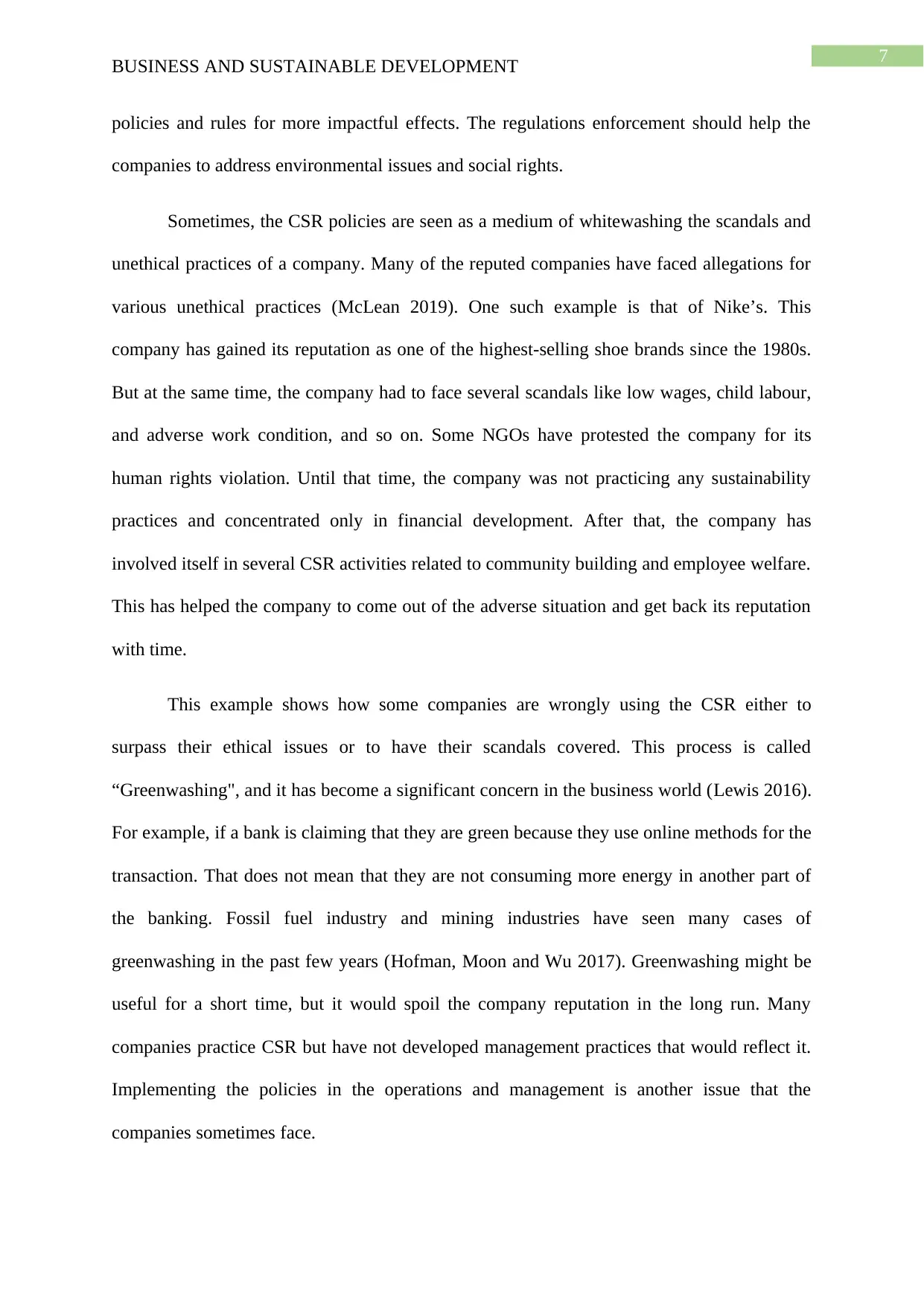
7
BUSINESS AND SUSTAINABLE DEVELOPMENT
policies and rules for more impactful effects. The regulations enforcement should help the
companies to address environmental issues and social rights.
Sometimes, the CSR policies are seen as a medium of whitewashing the scandals and
unethical practices of a company. Many of the reputed companies have faced allegations for
various unethical practices (McLean 2019). One such example is that of Nike’s. This
company has gained its reputation as one of the highest-selling shoe brands since the 1980s.
But at the same time, the company had to face several scandals like low wages, child labour,
and adverse work condition, and so on. Some NGOs have protested the company for its
human rights violation. Until that time, the company was not practicing any sustainability
practices and concentrated only in financial development. After that, the company has
involved itself in several CSR activities related to community building and employee welfare.
This has helped the company to come out of the adverse situation and get back its reputation
with time.
This example shows how some companies are wrongly using the CSR either to
surpass their ethical issues or to have their scandals covered. This process is called
“Greenwashing", and it has become a significant concern in the business world (Lewis 2016).
For example, if a bank is claiming that they are green because they use online methods for the
transaction. That does not mean that they are not consuming more energy in another part of
the banking. Fossil fuel industry and mining industries have seen many cases of
greenwashing in the past few years (Hofman, Moon and Wu 2017). Greenwashing might be
useful for a short time, but it would spoil the company reputation in the long run. Many
companies practice CSR but have not developed management practices that would reflect it.
Implementing the policies in the operations and management is another issue that the
companies sometimes face.
BUSINESS AND SUSTAINABLE DEVELOPMENT
policies and rules for more impactful effects. The regulations enforcement should help the
companies to address environmental issues and social rights.
Sometimes, the CSR policies are seen as a medium of whitewashing the scandals and
unethical practices of a company. Many of the reputed companies have faced allegations for
various unethical practices (McLean 2019). One such example is that of Nike’s. This
company has gained its reputation as one of the highest-selling shoe brands since the 1980s.
But at the same time, the company had to face several scandals like low wages, child labour,
and adverse work condition, and so on. Some NGOs have protested the company for its
human rights violation. Until that time, the company was not practicing any sustainability
practices and concentrated only in financial development. After that, the company has
involved itself in several CSR activities related to community building and employee welfare.
This has helped the company to come out of the adverse situation and get back its reputation
with time.
This example shows how some companies are wrongly using the CSR either to
surpass their ethical issues or to have their scandals covered. This process is called
“Greenwashing", and it has become a significant concern in the business world (Lewis 2016).
For example, if a bank is claiming that they are green because they use online methods for the
transaction. That does not mean that they are not consuming more energy in another part of
the banking. Fossil fuel industry and mining industries have seen many cases of
greenwashing in the past few years (Hofman, Moon and Wu 2017). Greenwashing might be
useful for a short time, but it would spoil the company reputation in the long run. Many
companies practice CSR but have not developed management practices that would reflect it.
Implementing the policies in the operations and management is another issue that the
companies sometimes face.
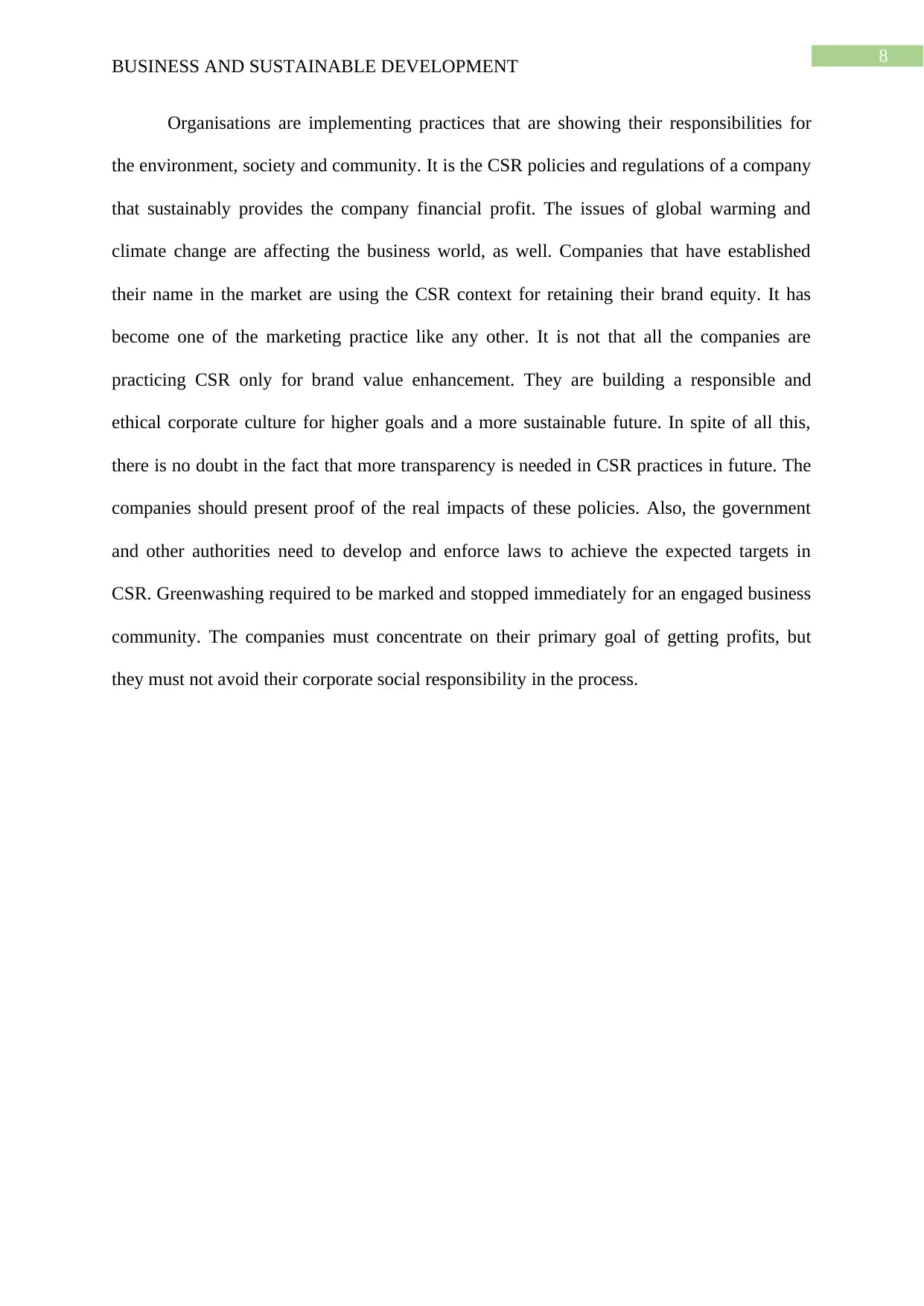
8
BUSINESS AND SUSTAINABLE DEVELOPMENT
Organisations are implementing practices that are showing their responsibilities for
the environment, society and community. It is the CSR policies and regulations of a company
that sustainably provides the company financial profit. The issues of global warming and
climate change are affecting the business world, as well. Companies that have established
their name in the market are using the CSR context for retaining their brand equity. It has
become one of the marketing practice like any other. It is not that all the companies are
practicing CSR only for brand value enhancement. They are building a responsible and
ethical corporate culture for higher goals and a more sustainable future. In spite of all this,
there is no doubt in the fact that more transparency is needed in CSR practices in future. The
companies should present proof of the real impacts of these policies. Also, the government
and other authorities need to develop and enforce laws to achieve the expected targets in
CSR. Greenwashing required to be marked and stopped immediately for an engaged business
community. The companies must concentrate on their primary goal of getting profits, but
they must not avoid their corporate social responsibility in the process.
BUSINESS AND SUSTAINABLE DEVELOPMENT
Organisations are implementing practices that are showing their responsibilities for
the environment, society and community. It is the CSR policies and regulations of a company
that sustainably provides the company financial profit. The issues of global warming and
climate change are affecting the business world, as well. Companies that have established
their name in the market are using the CSR context for retaining their brand equity. It has
become one of the marketing practice like any other. It is not that all the companies are
practicing CSR only for brand value enhancement. They are building a responsible and
ethical corporate culture for higher goals and a more sustainable future. In spite of all this,
there is no doubt in the fact that more transparency is needed in CSR practices in future. The
companies should present proof of the real impacts of these policies. Also, the government
and other authorities need to develop and enforce laws to achieve the expected targets in
CSR. Greenwashing required to be marked and stopped immediately for an engaged business
community. The companies must concentrate on their primary goal of getting profits, but
they must not avoid their corporate social responsibility in the process.
⊘ This is a preview!⊘
Do you want full access?
Subscribe today to unlock all pages.

Trusted by 1+ million students worldwide
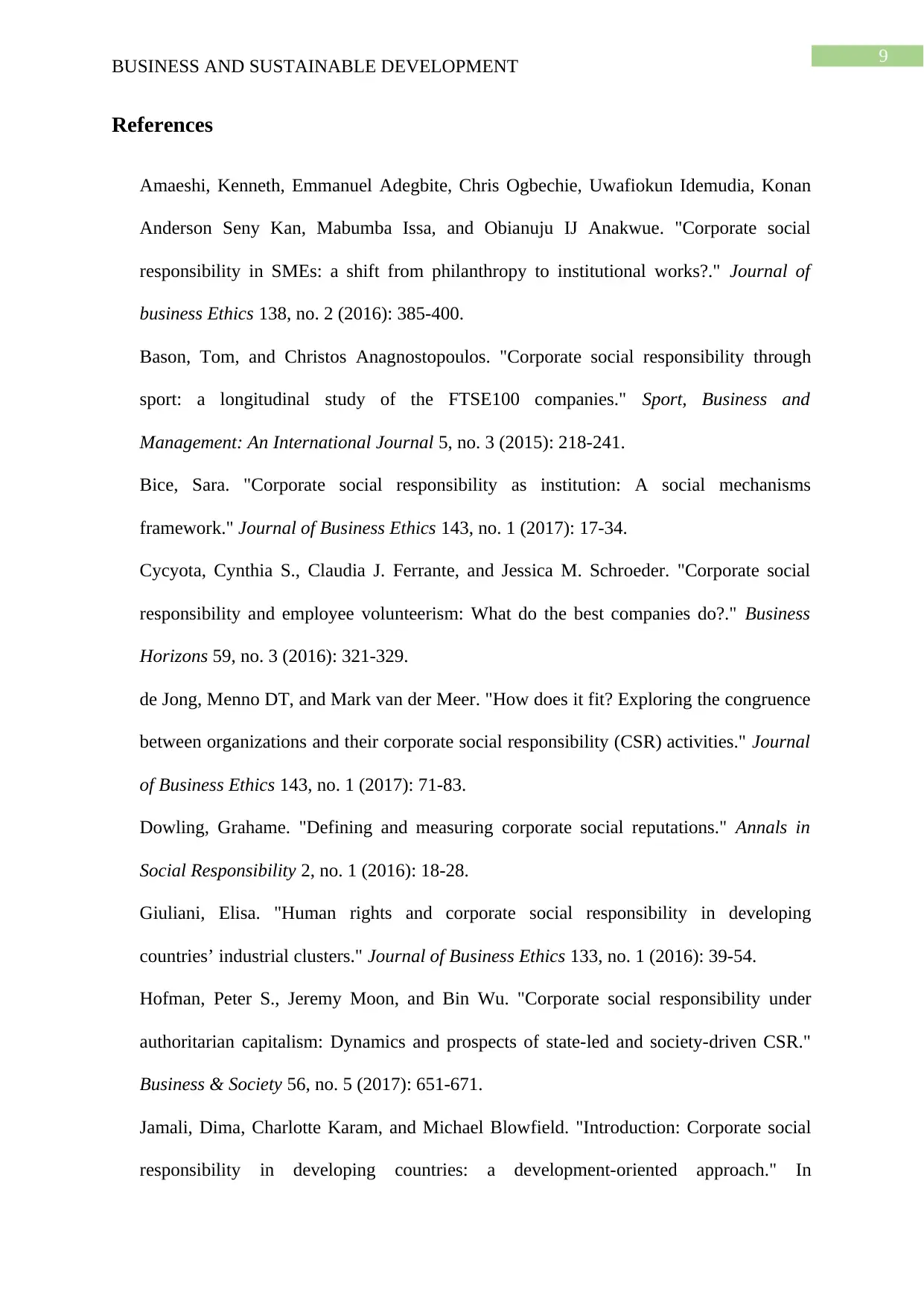
9
BUSINESS AND SUSTAINABLE DEVELOPMENT
References
Amaeshi, Kenneth, Emmanuel Adegbite, Chris Ogbechie, Uwafiokun Idemudia, Konan
Anderson Seny Kan, Mabumba Issa, and Obianuju IJ Anakwue. "Corporate social
responsibility in SMEs: a shift from philanthropy to institutional works?." Journal of
business Ethics 138, no. 2 (2016): 385-400.
Bason, Tom, and Christos Anagnostopoulos. "Corporate social responsibility through
sport: a longitudinal study of the FTSE100 companies." Sport, Business and
Management: An International Journal 5, no. 3 (2015): 218-241.
Bice, Sara. "Corporate social responsibility as institution: A social mechanisms
framework." Journal of Business Ethics 143, no. 1 (2017): 17-34.
Cycyota, Cynthia S., Claudia J. Ferrante, and Jessica M. Schroeder. "Corporate social
responsibility and employee volunteerism: What do the best companies do?." Business
Horizons 59, no. 3 (2016): 321-329.
de Jong, Menno DT, and Mark van der Meer. "How does it fit? Exploring the congruence
between organizations and their corporate social responsibility (CSR) activities." Journal
of Business Ethics 143, no. 1 (2017): 71-83.
Dowling, Grahame. "Defining and measuring corporate social reputations." Annals in
Social Responsibility 2, no. 1 (2016): 18-28.
Giuliani, Elisa. "Human rights and corporate social responsibility in developing
countries’ industrial clusters." Journal of Business Ethics 133, no. 1 (2016): 39-54.
Hofman, Peter S., Jeremy Moon, and Bin Wu. "Corporate social responsibility under
authoritarian capitalism: Dynamics and prospects of state-led and society-driven CSR."
Business & Society 56, no. 5 (2017): 651-671.
Jamali, Dima, Charlotte Karam, and Michael Blowfield. "Introduction: Corporate social
responsibility in developing countries: a development-oriented approach." In
BUSINESS AND SUSTAINABLE DEVELOPMENT
References
Amaeshi, Kenneth, Emmanuel Adegbite, Chris Ogbechie, Uwafiokun Idemudia, Konan
Anderson Seny Kan, Mabumba Issa, and Obianuju IJ Anakwue. "Corporate social
responsibility in SMEs: a shift from philanthropy to institutional works?." Journal of
business Ethics 138, no. 2 (2016): 385-400.
Bason, Tom, and Christos Anagnostopoulos. "Corporate social responsibility through
sport: a longitudinal study of the FTSE100 companies." Sport, Business and
Management: An International Journal 5, no. 3 (2015): 218-241.
Bice, Sara. "Corporate social responsibility as institution: A social mechanisms
framework." Journal of Business Ethics 143, no. 1 (2017): 17-34.
Cycyota, Cynthia S., Claudia J. Ferrante, and Jessica M. Schroeder. "Corporate social
responsibility and employee volunteerism: What do the best companies do?." Business
Horizons 59, no. 3 (2016): 321-329.
de Jong, Menno DT, and Mark van der Meer. "How does it fit? Exploring the congruence
between organizations and their corporate social responsibility (CSR) activities." Journal
of Business Ethics 143, no. 1 (2017): 71-83.
Dowling, Grahame. "Defining and measuring corporate social reputations." Annals in
Social Responsibility 2, no. 1 (2016): 18-28.
Giuliani, Elisa. "Human rights and corporate social responsibility in developing
countries’ industrial clusters." Journal of Business Ethics 133, no. 1 (2016): 39-54.
Hofman, Peter S., Jeremy Moon, and Bin Wu. "Corporate social responsibility under
authoritarian capitalism: Dynamics and prospects of state-led and society-driven CSR."
Business & Society 56, no. 5 (2017): 651-671.
Jamali, Dima, Charlotte Karam, and Michael Blowfield. "Introduction: Corporate social
responsibility in developing countries: a development-oriented approach." In
Paraphrase This Document
Need a fresh take? Get an instant paraphrase of this document with our AI Paraphraser
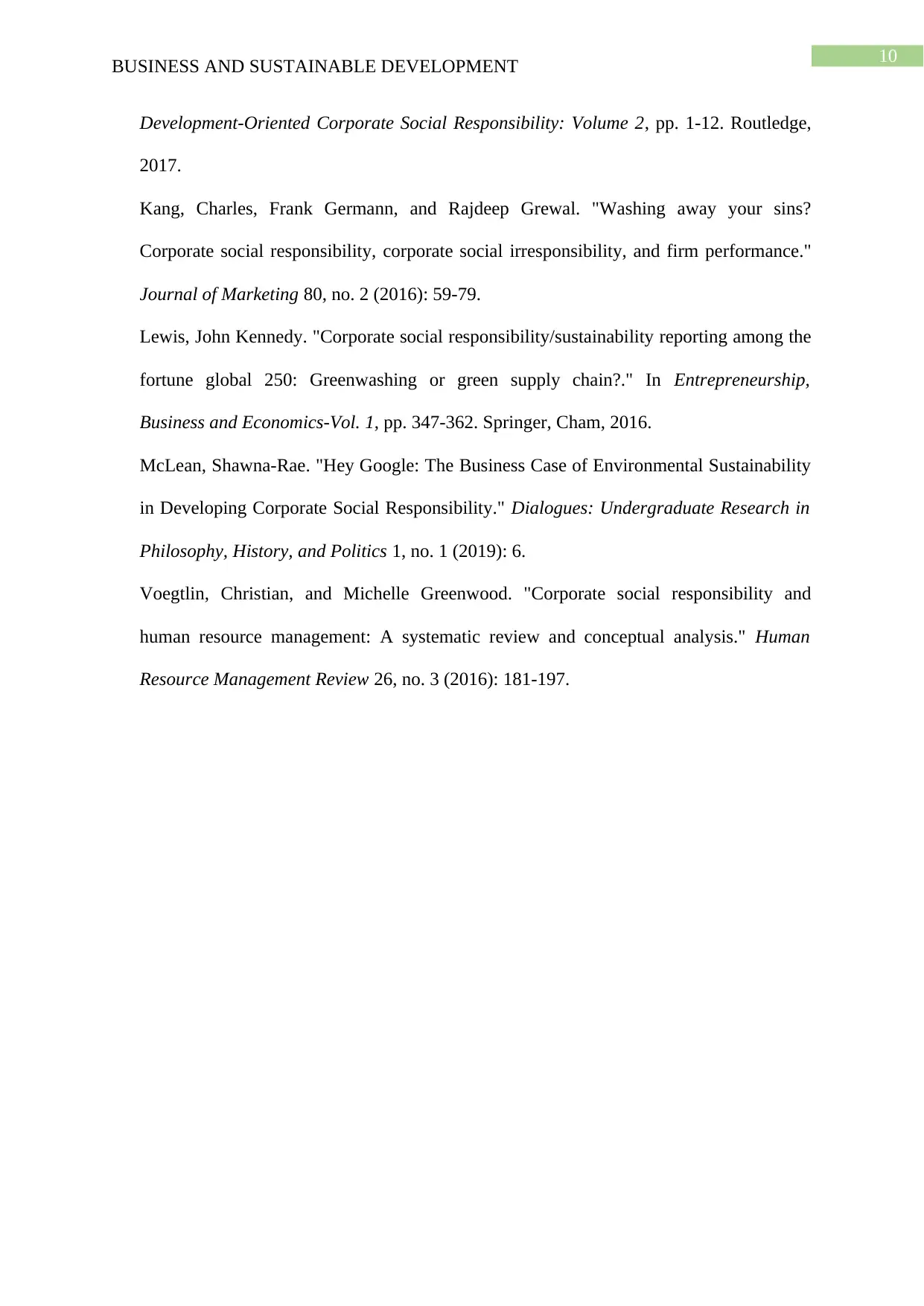
10
BUSINESS AND SUSTAINABLE DEVELOPMENT
Development-Oriented Corporate Social Responsibility: Volume 2, pp. 1-12. Routledge,
2017.
Kang, Charles, Frank Germann, and Rajdeep Grewal. "Washing away your sins?
Corporate social responsibility, corporate social irresponsibility, and firm performance."
Journal of Marketing 80, no. 2 (2016): 59-79.
Lewis, John Kennedy. "Corporate social responsibility/sustainability reporting among the
fortune global 250: Greenwashing or green supply chain?." In Entrepreneurship,
Business and Economics-Vol. 1, pp. 347-362. Springer, Cham, 2016.
McLean, Shawna-Rae. "Hey Google: The Business Case of Environmental Sustainability
in Developing Corporate Social Responsibility." Dialogues: Undergraduate Research in
Philosophy, History, and Politics 1, no. 1 (2019): 6.
Voegtlin, Christian, and Michelle Greenwood. "Corporate social responsibility and
human resource management: A systematic review and conceptual analysis." Human
Resource Management Review 26, no. 3 (2016): 181-197.
BUSINESS AND SUSTAINABLE DEVELOPMENT
Development-Oriented Corporate Social Responsibility: Volume 2, pp. 1-12. Routledge,
2017.
Kang, Charles, Frank Germann, and Rajdeep Grewal. "Washing away your sins?
Corporate social responsibility, corporate social irresponsibility, and firm performance."
Journal of Marketing 80, no. 2 (2016): 59-79.
Lewis, John Kennedy. "Corporate social responsibility/sustainability reporting among the
fortune global 250: Greenwashing or green supply chain?." In Entrepreneurship,
Business and Economics-Vol. 1, pp. 347-362. Springer, Cham, 2016.
McLean, Shawna-Rae. "Hey Google: The Business Case of Environmental Sustainability
in Developing Corporate Social Responsibility." Dialogues: Undergraduate Research in
Philosophy, History, and Politics 1, no. 1 (2019): 6.
Voegtlin, Christian, and Michelle Greenwood. "Corporate social responsibility and
human resource management: A systematic review and conceptual analysis." Human
Resource Management Review 26, no. 3 (2016): 181-197.
1 out of 11
Related Documents
Your All-in-One AI-Powered Toolkit for Academic Success.
+13062052269
info@desklib.com
Available 24*7 on WhatsApp / Email
![[object Object]](/_next/static/media/star-bottom.7253800d.svg)
Unlock your academic potential
Copyright © 2020–2026 A2Z Services. All Rights Reserved. Developed and managed by ZUCOL.





